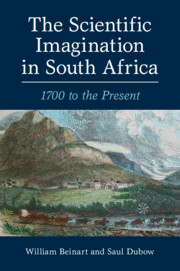Book contents
- The Scientific Imagination in South Africa
- The Scientific Imagination in South Africa
- Copyright page
- Contents
- Map
- Figures
- Acknowledgements
- Introduction: The Scientific Imagination in South Africa
- 1 Scientific Imagination and Local Knowledge at the Cape in the Eighteenth Century
- 2 Scientific Governance and Colonial Institutions, c. 1800–70
- 3 Technological Innovation and the Scientific Imagination in Mining and Agriculture, 1870–1902
- 4 Science, Reconstruction and the Imagining of the First ‘New’ South Africa, 1902–29
- 5 The Commonwealth of Knowledge, 1930–48
- 6 The Republic of Science, 1948–90
- 7 Big Science and Indigenous Knowledge: Post-Apartheid South Africa and the African Renaissance
- Afterword
- Select Bibliography
- Index
1 - Scientific Imagination and Local Knowledge at the Cape in the Eighteenth Century
Published online by Cambridge University Press: 07 May 2021
- The Scientific Imagination in South Africa
- The Scientific Imagination in South Africa
- Copyright page
- Contents
- Map
- Figures
- Acknowledgements
- Introduction: The Scientific Imagination in South Africa
- 1 Scientific Imagination and Local Knowledge at the Cape in the Eighteenth Century
- 2 Scientific Governance and Colonial Institutions, c. 1800–70
- 3 Technological Innovation and the Scientific Imagination in Mining and Agriculture, 1870–1902
- 4 Science, Reconstruction and the Imagining of the First ‘New’ South Africa, 1902–29
- 5 The Commonwealth of Knowledge, 1930–48
- 6 The Republic of Science, 1948–90
- 7 Big Science and Indigenous Knowledge: Post-Apartheid South Africa and the African Renaissance
- Afterword
- Select Bibliography
- Index
Summary
When the Dutch plunged into the Indian Ocean at the beginning of the seventeenth century, they brought with them both a new form of capitalism and fresh ways of looking at nature. Their sprawling seaborne empire turned Amsterdam and Leiden into centres for the collection of global knowledge. Colonised regions were systematically scoured for valuable natural resources and curiosities. Jan van Riebeeck, Simon van der Stel and Rijk Tulbagh, among other Cape governors, were keen amateur naturalists. The Cape’s natural diversity in plants and animals attracted literate travellers with a scientific bent and the botanical gardens served as a portal to exchange of botanical knowledge. The late eighteenth and early nineteenth centuries produced a rich literature on South Africa, as scientific interest drew it into the orbit of educated Europeans. Some of the writers became scientists of consequence, including Thunberg, who became the leading botanist in Sweden; Lichtenstein, a professor of zoology in Berlin; and Barrow, a key scientific figure in the British Admiralty. These travellers often reported local knowledge and collectively created a literary tradition about the Cape that helped to define the region’s character and interest to scientists.
Keywords
- Type
- Chapter
- Information
- The Scientific Imagination in South Africa1700 to the Present, pp. 29 - 65Publisher: Cambridge University PressPrint publication year: 2021



